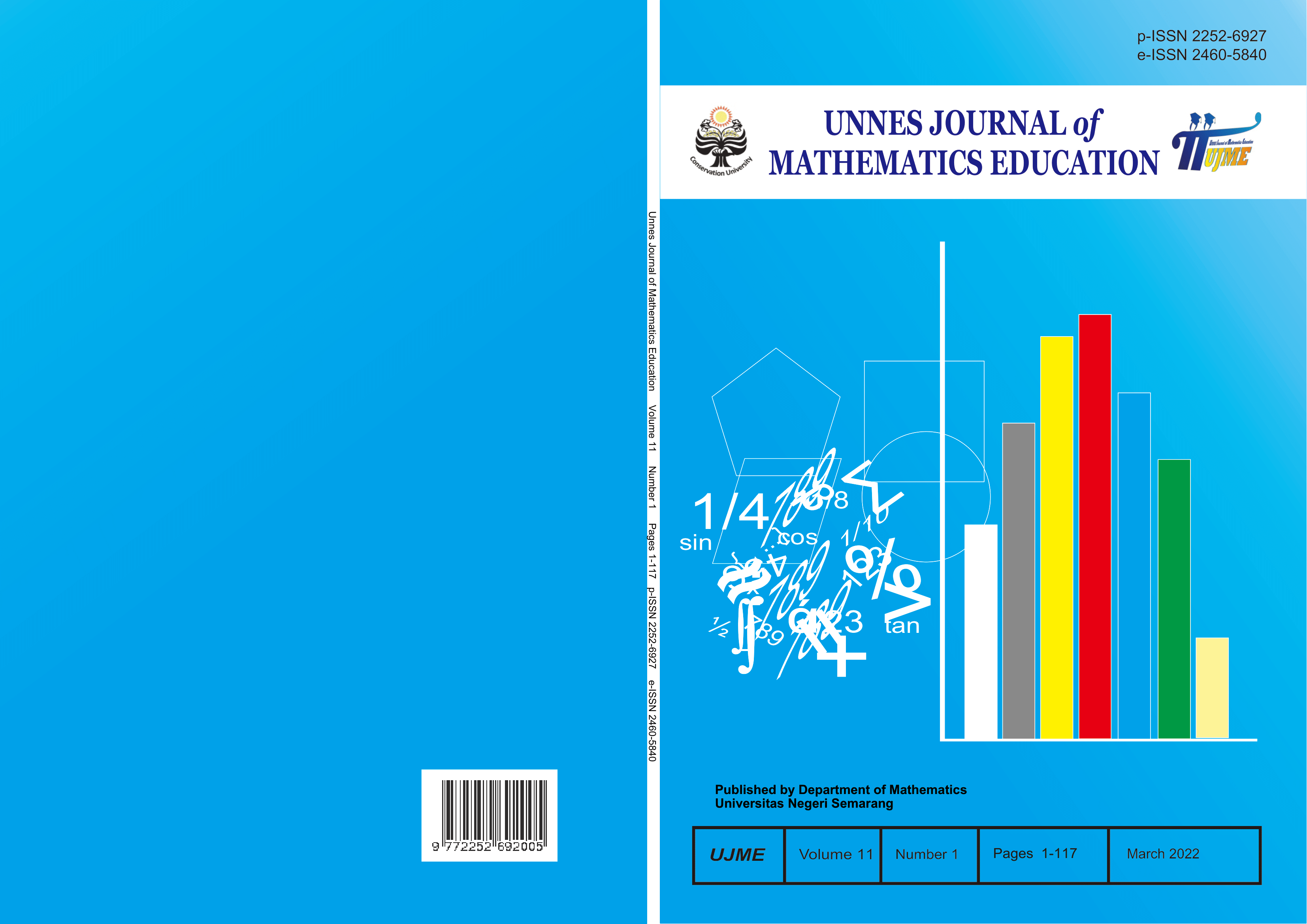Mathematical Creative Thinking Ability in terms of the Habits of Mind in PBL with a Management System with a Goal Free Problems strategy
##plugins.themes.academic_pro.article.main##
Abstract
Problem Based Learning with a Management System with a Goal Free Problems strategy is given to improve the mathematical creative thinking skills of class X MIPA students at SMA Negeri 8 Semarang which are not yet optimal. . Purpose main from study this is analyze ability think learners reviewed from Habits of Mind , as consequence from application of learning models Problem Based Learning help The LMS is Google Classroom . Method research used _ that is mixed methods with posttest only control design . Sample taken two class with technique random sampling from population class X MIPA 8 Semarang . Experiment class use PBL model with Management System with Goal Free Problems strategy whereas class control using the PBL model. Subject in research this as much 8 student from class experiment . Qualitative data analysis i.e. result data interview and results test mathematical creative thinking skills subject research . Research results showing that : (1) ability think creative mathematical participant educate reviewed from Habits of Mind in PBL with Management System reach more from criteria minimum completeness is 68; (2) ability think creative mathematical participant educate reviewed from Habits of Mind in PBL with Management System reach completeness classic that is more from 75% of participants educate reach limit complete ; (3) average ability think creative mathematical reviewed from Habits of Mind in PBL with Management System more tall from Problem Based Learning model learning ; (4) proportion completeness results test ability think creative mathematical reviewed from Habits of Mind in PBL with Management System more tall from Problem Based Learning model learning ; (5) ability think creative mathematical with four indicator think creative is in the subject category Persisting , Thinking about Thinking , Thinking Flexibly , and Applying Past Knowledge to New Situations .
##plugins.themes.academic_pro.article.details##
References
Dewi & Masrukan. 2018. “Peningkatan Kemampuan Berpikir Kreatif Matematis Mahasiswa Program Magister”. PRISMA, 1: 539-546.
Hasanudin, et al. 2018. “Optimalisasi Pemanfaatan Google Classroom sebagai Media Pembelajaran di SMK Negeri 1 Bakinang” . Journal of Education For Mu Negeri Vol. 2 No. 1: 17-20.
Hashim, Hartini., Mohd Norawi Ali & Mohd Ali Samsudin. 2018. Nurturing Habits of Mind (HOM) Through Thinking Based Learning (TBL) in Doing Science Technology, Engineering and Mathematics (STEM) Project. EDUCATUM JSMT Vol. 5 No. 2. 7-18.
Hosnan. 2016. Psikologi Perkembangan Peserta Didik . Bogor: Ghalia Indonesia.
Kowiyah. 2016. “Peningkatan Kemampuan Berpikir Kritis dalam Pemecahan Masalah Matematis menggunakan Pendekatan Open-ended ”. Journal of Basic Education Innovation, 1(2):67-74.
Masrukan. 2017. Assesmen Otentik Pembelajaran Matematika. Semarang: FMIPA UNNES.
Nizam. 2016. HOTS Untuk Membangun Literasi Abas 21. Kepala Pusat Penelitian Pendidikan..
Rochmad, & Masrukan. 2016. "Studi Kinerja Mahasiswa Dalam Menganalisis Materi Pada Pembelajaran Kooperatif Resiprokal”. Kreano, Journal of Creative-Innovative Mathematics , 7(1): 45-57.
Saironi, M. & Sukestiyarno. 2017. " Kemampuan Berpikir Kreatif Matematis Siswa dan Pembentukan Karakter Rasa Ingin Tahu Siswa pada Pembelajaran Open Ended Berbasis Etnomatematika". Unnes Journal of Mathematics Education Research , 6(1): 76-88.
